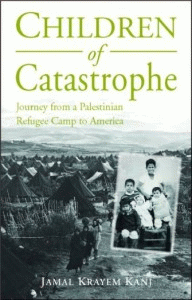Author Jamal Kanj talks about life in a Palestinian refugee camp in Lebanon. In his recent book "Children of Catastrophe: Journey from a Palestinian refugee camp to America," provides an account of life from Palestine to refugee camps in Lebanon and the events leading for the creation of the state of Israel.
Elias Harb -- EXCLUSIVE INTERVIEW -- With Jamal K. Kanj: Author Children of Catastrophe

Jamal Kanj
A great deal has been written over the years addressing the Palestine--Israel conflict, and the creation of the Palestinian refugee problem. However, few works on the subject really present the personal aspect: What is it like to be a refugee? What propels a decent human being to take up arms, to become a freedom fighter or a "terrorist?"
This book tells the remarkable story of one such refugee, following his journey from childhood in the Nahr El Bared Palestinian refugee camp in Lebanon, becoming a member of the Palestine Liberation Organization (PLO), through to eventual emigration, a new life as an engineer in the United States, and a "return' trip to historic Palestine.
Jamal Kanj joined me in an exclusive interview to discuss his book Children of Catastrophe: Editor Elias Harb
==================
ELIAS HARB: In your book you convey the personal aspect of the life of the refugees. Can you tell us what inspired you to write Children of Catastrophe?
JAMAL K. KANJ: The Americans and the West in general are not well aware of the Palestinian experience. On the surface and at an emotional level, they are generally more sympathetic towards Israel, but this is mainly due to their lack of understanding or total disconnect with the human side of the Palestinian story.
Also one must recognize that the peculiar relationship between Israel and the West is deeply rooted in a long history of abhorrent Western anti Semitism culminating in the Holocaust. Hence, it was a mix of sympathy, guilt, and religious institutions in America and Europe which played an important role in shaping the lopsided view towards the Palestine Israel conflict.
Having lived in the US for thirty years after leaving the camp, I discovered that most people tend to switch off when trying to make an intellectual or historical argument explaining the Palestinian position. At the same time, I observed that the majority can better connect and listen when the intellectual or the historical argument is framed within the personal experience. During those 30 years, almost everyone whom I came to know at a social level consciously or subconsciously became more sympathetic with the Palestinians.
To sum it up, the main impetus for writing this book remains my strong conviction that we, as Palestinians have a powerful story to share with the rest of the world, especially in the West. Throughout the pages of this book, I hope to connect with all those whom I have not, or may not have had the honor meeting personally, to share with them the personal aspects of the Palestinian side of the story.
(Note: You can view every article as one long page if you sign up as an Advocate Member, or higher).





